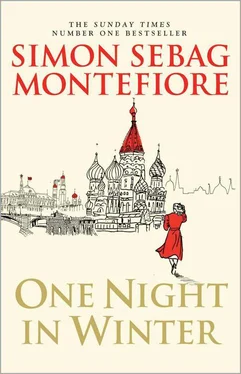‘This is much more awkward than…’ he said, and they laughed out of nerves and she realized he meant her snakeskin, and that both were to be celebrated.
Afterwards, she felt beautiful for the first time in her life. She had sloughed off her ungainliness; yes, she smiled to herself, just as a snake sheds its skin.
DASHKA DOROVA AND Hercules Satinov did not see each other again until the first day of term at School 801. It was May, and at the Golden Gates, he could see Dashka and she could see him and sometimes, as they passed one another, she would whisper: ‘More than yesterday. Less than tomorrow.’ Or just one word: ‘Almaz!’ But they were constantly watched by spouses, comrades, their own bodyguards and assistants, and both were wary of hurting their families or drawing the attention of the Organs.
When Satinov looked into his heart, he knew he loved Tamriko. He loved Dashka too, but it was a different species of love, and she came second to Tamriko. He saw no contradiction. There were many shades of love, he told himself. Together they made him complete. As for the secrecy, that cost him nothing: he was a Bolshevik.
They had found a way to phone each other. Sometimes the phone rang in the conference room next to his office.
‘Hello, it’s me!’ She would use his words.
‘Hello, me.’
‘I love you,’ she’d say.
‘I love you and love being loved by you: it’s the most unexpected joy for me, this secret jewel in my life.’
‘But where can this go?’ she would ask, anxious suddenly.
‘For me, it doesn’t have to go anywhere. It just is.’
She laughed. ‘Is this really you, the Iron Commissar? How has this great romantic survived all these years in the age of ice?’
‘I imagine kissing you when we’re in our sixties.’
‘One day, if we were both on our own, somehow, God forbid, then I know we would be together.’
‘What are you wearing?’ he would ask. ‘What are you doing today?’ He hated Genrikh because true possession is to share the fabric of someone else’s life, he decided; it’s about proximity; love as geography. He longed to know the soft sound of her sleeping and the sleepy smell of her hair in the morning; he wanted to be standing next to her when she brushed her teeth and at the foot of the stairs when she descended them. When she sat down to read, where did she sit?
‘It’s pure heaven when we talk,’ he said to her one evening.
‘When we talk, it’s as if no one else is in the room,’ she agreed. ‘I love our calls and I love you. More than yesterday. Less than tomorrow.’
Everything was different for Serafima that term. Before she and Frank had made love, the boys in the school had been intrigued by her squareness, but now it was as if she had been sprinkled with an invisible dust of attraction. Only long afterwards did she realize it was sex.
The boys seemed to sense it, even though they themselves were not sure what it was. They caught her eyes. They watched her, and when she turned suddenly, they looked away. They invited her to join their sports societies, literature clubs, Komsomol camps. George and Minka called her ‘the Mystery’; the new boy, Andrei Kurbsky, had a crush on her; and Nikolasha Blagov was obsessively in love with her. Even Vasily Stalin sensed the difference, that she was already a woman. In class, she was Benya Golden’s favourite. And then, out of the blue, Dr Rimm started to write her weird and cloddish love letters.
‘It’s ridiculous! I’m probably the only girl in the school who’s not a virgin. But how can they tell?’ she asked Frank.
‘There are whistles that only dogs can hear.’ He smiled at her, yet she could see the strain in his eyes. It worried him a little. ‘Like an oasis in a desert: men might not be able to see the well but they can smell water.’
The truth was that she was enjoying the attention. She wondered which would be worse in the eyes of the school, the Party – the fact that she was making love almost every day (provided she could lose her mother who always wanted to take her shopping) or that she was in love with an American arch-capitalist. Her entire being was devoted to protecting the treasure that she lived for. It was a dangerous secret, to be sure. Yet it couldn’t hurt anyone, could it?
And then came the day of the Victory Parade, and Nikolasha and Rosa’s deaths on the bridge. At the Golden Gates the next morning, Dashka managed to grab a moment with Satinov. Checking that no one could hear, and then speaking very fast, she said, ‘Hercules, call me today at the clinic conference room.’
Losha drove him through the Kremlin gates and he climbed the steps to his office in the Yellow Palace. At 10 a.m., he called her.
‘I’ve got to let you go,’ she said. ‘This terrible tragedy changes everything. I have to put my children first. I can’t do anything that could harm them. I have to make it up to my family.’
‘Of course,’ he managed to say. ‘You’re right. I understand.’
‘You’ll always be part of my life. There’s only ever been you and Genrikh and there’ll never be anyone else.’
His throat tightened and he could scarcely speak. I’m the Iron Commissar, he told himself, I can’t be feeling like this. ‘I’ve never loved like this before,’ he said, ‘and I’ll love you until I die.’
‘You can’t keep telling me that,’ she said. He could tell she was weeping. ‘We’ve got to get over these feelings. But I’ll always be here for you.’
‘And me for you. Don’t forget me then?’
‘How could I forget you? I hope you can forgive me?’
‘I will always forgive you, Dashka,’ he said. ‘Always.’ But as he put down the phone, he knew a punch in the stomach could not have hurt him more. When he had given his orders to his aides, he locked the doors and then he fell to his knees beside the lifesize Gerasimov painting of Stalin and started to sob, beating his forehead on the parquet again and again. ‘How can I live without your love?’ he heard himself saying. ‘How can I go on?’
When Frank attended the Bolshoi a few days later, and she was not there, he was struck with an awful fear. She had not arranged how to let him know where she was. And no one knew of him so no one could take the message.
He left her secret messages in the House of Books and attended the Bolshoi every day, hoping he would see her in her usual seat. But no. Night after night passed, and still no Serafima.
He couldn’t sleep; he couldn’t eat; he imagined the most diabolic things: that she was being raped, or tortured, or that she had already been shot, or despatched to the furthest camps. But while the Satinovs and Dorovs could talk about what was happening, and share the pain with their loved ones, no one in Frank’s world knew about Serafima. He hadn’t talked about their relationship with the ambassador or his fellow diplomats, and he had never met her family. He fantasized about calling her parents – he had seen so many of her mother’s movies – but it was too late for that now.
He would have preferred to see her running into school, safe and happy, even if it meant that she had forsaken him and he would never see her again. But she was not at the school gates on the days he’d stood outside, watching from a distance, desperate for a glimpse of a tall girl with long fair hair.
And then one night at the ballet, he glanced down at the stalls, and there she was. She was back!
Satinov held Tamriko in his arms as she told him about Mariko. ‘The greatest privilege of childhood’, she said, ‘is to live safely in the present. That’s why I became a teacher. I wanted that for Mariko.’
Their daughter’s arrest and the agonizing scenes at the Lubianka made him reel. For the first time in his life, he was spinning out of control. He had not wavered when his comrades were being arrested and shot, when his army group was surrounded, even when his eldest son was reported missing and then dead. But now he was struggling to dam up the raging torrent of his obsession for a woman who was not his wife.
Читать дальше












